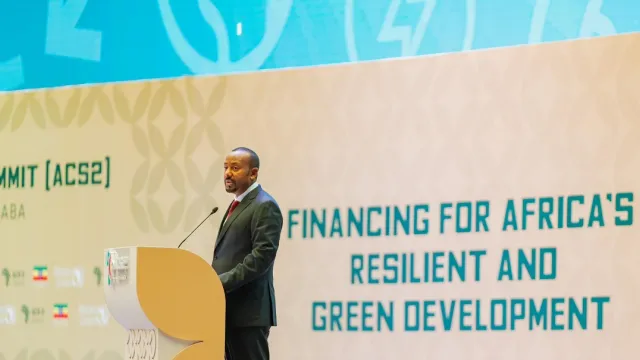Ethiopia urges Africa to form own path to combat climate change

𝗗𝗿. 𝗔𝗯𝗶𝘆 𝗔𝗵𝗺𝗲𝗱, Prime Minister of the Federal Democratic Republic of Ethiopia.
With increasing negative impacts of climate change triggering economic fallout across Africa, policymakers and leaders are increasing the call for Africa-led solutions to stem destruction of the environment and millions of livelihoods.
At the ongoing second Africa Climate Summit in Ethiopia, leaders across the continent have been challenged to shift from rhetoric to action by championing the roll out of solutions while positioning their countries for the next global climate economy.
Speaking at the second Africa Climate Summit in Addis Ababa, Ethiopian Prime Minister Abiy Ahmed challenged the world to rethink Africa’s role in addressing the adverse effects of climate change.
"Too often, Africa’s story at climate summits starts with what we lack—finance, technology, time. Let's start instead with what we have,” said Abiy.
Further, Abiy shared his country’s undertakings in addressing the impact of climate noting that under the Green Legacy Initiative, his administration has overseen the planting of 48 billion trees in seven years.
Ethiopia is also running the climate-resilient wheat initiative, a project that aims at assuring food security in Africa’s second most populous country while giving farmers a reliable means to earn livelihoods in the face of extreme weather conditions.
Additionally, Ethiopia projects to generate over 5,000MW of renewable energy in the newly commissioned Grand Ethiopian Renaissance Dam (GERD), a project that has soured relations with Sudan and Egypt over water usage.
Design climate economy
“We are not here to negotiate our survival. We are here to design the world’s next climate economy. When Africa’s land heals, when our rivers run clean, and our air is fresh, Africa wins—and the whole world breathes easier,” the Ethiopian PM told delegates in Addis Ababa.
He further called on leaders to better tap Africa’s unique advantages: the youngest population in the world, bursting with creativity and innovation; the fastest-growing solar belt on Earth; the world’s last great carbon vaults—our forests, wetlands, and coasts; and vast arable land capable of feeding a growing continent and beyond, to design long-term solutions to counter climate change.
At the same time, the Chairperson of the African Union Commission Mahmoud Ali Youssouf added weight in global call for increased finances to climate action projects in the continent.
“The African Union Commission firmly believes that climate finance must be fair, significant, and predictable. The vulnerability of our member countries—exacerbated by climate change, debt burdens, and structural inequalities in the global financial system—must be addressed through climate justice and genuine cooperation,” explained Youssouf.
The AU Chairperson noted that the aspirations of our countries for substantial and meaningful financing must be taken seriously and with determination. This must be achieved through a genuine fund for loss and damage, endowed with sufficient financial resources.
Additionally, he noted, carbon credits should not be managed by polluting states at their discretion but rather by an independent international body with supranational authority.
“The Green Fund must also be renewed and redirected towards financing projects that deliver regional and continental climate value,” he said.
Kenya remains at risk of adverse effects of extreme weather due to its varied topography, diverse climatic zones, and an overreliance on rain-fed agriculture to feed its growing population that is forecast to double the turn of the century.
At the summit, President William Ruto warned that: “No nation can solve this crisis alone. Only bold, united, and sustained collaboration can avert a climate catastrophe.”
Dr. Ruto, host of the inaugural Africa Climate Summit in Nairobi, stated that, “We framed climate action not as a burden, but as a driver of economic growth, transformation, and job creation.”




